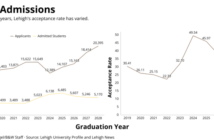
William Newbegin
North Carolina rapper J. Cole has returned with his fifth studio album, “KOD.”
Cole is one of the most polarizing artists in hip-hop, and I find that his listeners usually fall into one of two camps. There are those who feel that his music is cutting edge and that he sits among the upper echelon of socially conscious rappers. And there are those who find his art to be downright preachy and subpar.
My view of J. Cole’s music falls somewhere comfortably in between the two camps. I have been a fan of Cole’s past projects, such as “2014 Forest Hills Drive,” and his feature and contributions to artists like Joey Bada$$ and Kendrick Lamar.
Conversely, my opinions align with many criticisms of Cole’s music, including his very lackluster approach to social commentary and mediocrity in songwriting.
Consequently enough, it’s these flaws that turn worthwhile artistic ideas into the mixed bag that is “KOD.”
In terms of strengths, Cole offers throughout the 12-track LP, there are several examples of able penmanship. Critique him as you will, Cole deploys brainy punchlines or impressive rhyme schemes at several instances throughout “KOD.”
After opening with an unnecessary and unspecific cautionary aside, the album’s first track and title track provide good examples of Cole’s bars.
Cole raps “Haven’t you heard? I’m cold as the tip / Tip of the iceberg that tipped the Titanic / No tip-toein’ ‘round it, my (expletive) is gigantic / As big as the (expletive) Atlantic.”
Cole finds some nice momentum when he crafts a narrative surrounding his life story. On tracks like “Once an Addict (Interlude)” — on which Cole discusses his mother’s alcoholism — and “FRIENDS” — which discusses drug culture — there is a certain ferocity in his delivery, which helps to develop two of the album’s stronger songs.
Yet, Cole’s ability with a pen and mic vanishes beyond these few moments: “KOD” is otherwise comprised of filler lyricism and lacks any memorable refrains. He sings several of these hooks with a voice that is as painfully unmelodic as it is forgettable.
Is J. Cole so stubborn as to sacrifice the quality of music for the sake of having no features on his album? I firmly believe several of these hooks might be a shade more catchy if sung by someone with legitimate vocal chops.
Instead, Cole capitalizes on the delusional corner of hip-hop fandom that believes just because a rapper’s lyricism and performances are 100 percent unique to their artist, they are automatically more potent. This is sadly misinformed, and I offer you Kendrick Lamar’s “The Blacker the Berry,” with eight credited writers, as proof of that.
Cole takes the reigns as rap’s resident social critic throughout the course of “KOD,” and does so in lazy, superficial fashion. The album’s title stands as an acronym for Kids on Drugs, King Overdosed, or Kill Our Demons. They ostensibly represent an overarching “theme” for the LP.
However, throughout the album’s 43-minute runtime, Cole fails to address these nondescript themes in great detail. He often points fingers at problems, like addiction, on tracks like “Once an Addict” or “FRIENDS,” but his commentary usually ends there and amounts to nothing more than a casual observation of a conspicuous societal issue.
Then there are the “conscious” tracks that have little bearing on the album’s title and supposed theme, such as “Photograph,” which, in my opinion, is the auditory equivalent of a half-assed Black Mirror episode.
Cole’s message here can be boiled down to “Oh no, technology can weaken people’s interactions.” Yawn.
And then lastly, there’s the preachy “1985 (Intro to ‘The Fall Off’),” which takes the slightest of shots at new wave Soundcloud rappers such as Lil’ Pump, accusing them of appealing to trends too closely. Interestingly enough, Cole mimics the sounds of this brand of rap on “KOD,” as many of the LP’s beats feature high-volume, distorted bass along with trap drums that provide very little flavor or personality to an already-uninspiring catalog of instrumentals.
While “KOD” has good intention and some good bars here and there, J. Cole’s ideas get lost in a mix of unambitious songwriting and superficial attitudes.
RATING: 2/5
If you want something similar, listen instead to: “Piñata” by Freddie Gibbs and Madlib (2014), “We got it from Here…” by A Tribe Called Quest (2016).
What to check out now?: Janelle Monae’s “Dirty Computer”, Wiley’s “Godfather II”, Post Malone’s “Beerbongs & Bentleys.”
—
William Newbegin, ’21, is an assistant sports editor and columnist for The Brown and White. He can be reached at [email protected].





Comment policy
Comments posted to The Brown and White website are reviewed by a moderator before being approved. Incendiary speech or harassing language, including comments targeted at individuals, may be deemed unacceptable and not published. Spam and other soliciting will also be declined.
The Brown and White also reserves the right to not publish entirely anonymous comments.
1 Comment
William, you barely scratched the surface of the messages Cole was delivering in KOD, listen again.
KOD, in terms of artistic message, is much more powerful than your beloved 2014 Forest Hills Drive.
Try Country music, it looks like it might suit you better